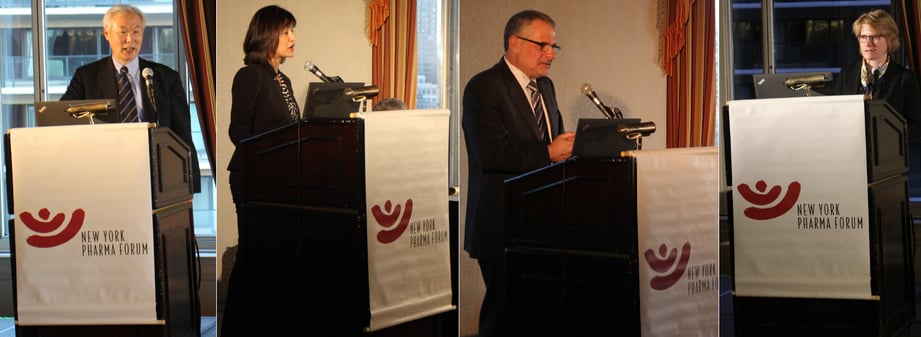December 11, 2015, New York – “We reinvent pharma every few years, we’re always reinventing pharma, but you don’t see the drastic changes on a daily basis. This is why it’s a great value to step back and realize that we do in fact live in a changing time with serious challenges to our current business model,” said Ed Saltzman, President and Founder, Defined Health, at the 26th Annual General Assembly of the New York Pharma Forum.
The program, which took place on December 4th at the New York Athletic Club in New York City, included several speakers (listed in alphabetical order) in addition to Mr. Saltzman, who served as panel facilitator:
- Akihiko Matsubara, Managing Director, The Japan Pharmaceutical Manufacturers Association (JPMA)
- Laurie J. Olson, Executive Vice President, Strategy, Portfolio and Commercial Operations, Pfizer Inc.
- Ramona Sequeira, President, Takeda Pharmaceuticals U.S.A., Inc.
 |
|||
| Akihiko Matsubara | Ramona Sequiera | Ed Saltzman | Laurie J. Olson |
Taking a broad look at the industry Mr. Saltzman commented, “The scientific revolution is here. Pharma productivity is up, Phase III failures are down, and a rapid transformation is occurring between academic discovery and valuation with scientific innovation getting rewarded far faster than in prior history. For example, it took Sangamo BioSciences, a gene expression editing company, 20 years to reach today’s market value of $500 million, but in the four years since the first publications mentioning CRISPR as a platform, three advanced gene editing companies have been created that have raised hundreds of millions of dollars.
CRISPR, or “clustered regularly interspaced short palindromic repeats,” was a force Mr. Saltzman said is changing the biopharma industry, along with high pricing for drugs affecting small patient populations. He said that while there is great focus on R&D for cancer, there is insufficient focus on diseases causing the greatest economic impact, such as mental, neurological and musculoskeletal disorders.
Mr. Matsubara said that JPMA’s priorities are evaluating innovation, compliance issues, and supporting business globalization, including a focus on emerging markets. He pointed to new Japanese government support for the biopharmaceutical industry, including the establishment of the Agency for Medical Research and Development (AMED), which the Japanese government has modelled on the U.S. National Institutes of Health (NIH). AMED will offer government sustenance for basic research and accelerated development, and a network of support mechanisms for promising innovative drugs, including enhanced intellectual property strategies and budget support. Newly designated “Core Hospitals” will function as clinical trial centers to oversee trials and generate better patient enrollment and data collection. In addition, a newly implemented regulatory framework will enable promising drugs to get a shortened review period in order to fast-track regulatory approval.
“While the reputation of the biopharmaceutical industry is low in many countries, this is not the case in Japan, where 84 percent of respondents to a JPMA survey expressed feelings of trust towards the industry.” He surmised that this sentiment was partly due to the National Health System covering most of the cost for medical treatments throughout the country.
Ms. Sequeira started her presentation by explaining how transformation in the healthcare industry is felt especially strongly in the United States. Ms. Sequeira said “We all need to respond to a changing market,” and shared that Takeda Pharmaceuticals U.S.A., Inc. is throwing out the playbooks from the past and examining how it can best serve patients through innovative therapies, strategic partnerships and access and assistance programs.
She commented, “everything we do at Takeda follows our four prioritized principles of patients at the center, building trust with society, reinforcing the reputation of the company and delivering superior business performance as the company transforms from a Japanese organization with a global presence to a global one with Japanese roots.”
Ms. Sequeira focused on three important dynamics affecting the U.S. healthcare landscape: evolving models of care, cost containment and the rapid uptake of technology. “The increase in negotiating power of the payers [health insurance companies] is affecting our business and our companies and means we need to partner with them in a more tailored way to ensure patients get access to our innovation,” she said.
Ms. Olson stated that the five key drivers shaping the industry today are demographic, social, technological, political and economic, and a scientific renaissance. “There is a growing sense of empowerment among our patient population,” she said. “Patients around the world are taking a more proactive role in their own healthcare.”
She described a future when the insights from “big data” could transform discovery targets and clinical development pathways to speed product development. Ms. Olson went on to discuss that future health technology is being shaped by big data, sensors, artificial intelligence and cognitive computing, and noted that technology companies such as Google, Apple and IBM are developing new healthcare technology. “Big tech companies are now sitting at the healthcare table, promising key insights to medical decision makers,” she said. She added that collaborations with academia, disease foundations, tech companies, as well as public partnerships are changing the biopharma landscape.
Prior to the General Assembly, the organization held its annual meeting and elected a new board of directors and officers. Thomas Heffner, Ph.D., Executive Director of Global Business Development at Pfizer, was re-elected as president. Other officers elected were:
- Vice president: John Guarino, Ph.D., Head, Global Development Administration, Sunovion Pharmaceuticals Inc.
- Secretary: Yasuhiko Sakoe, Ph.D., President, Kyorin USA
- Treasurer: Kenji Kaneko, Executive Director, Strategic Alliances, Merck & Co.

